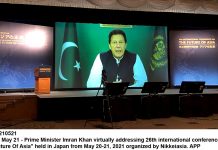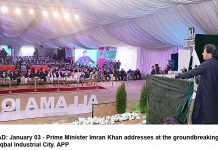In his speech before the National Assembly on May 16, 2016, the Prime Minister, while explaining the money trail for purchase of London flats claimed that his late father, Mian Muhammad Sharif, established a company in the name of Gulf Steels in Dubai in 1972 and sold it in 1980 for US $9 million. He further revealed that late Mian Sharif also set up a steel mill in Jeddah, after the family was sent abroad on December 10, 2000 by Pervez Musharraf, who confiscated all their assets. He said that capital for this came through the sale of the Dubai factory. The first question is how was the money sent to Dubai? It is now a confession that sale proceeds were lying abroad from 1980 to the day of investment in Saudi Arabia! Investigation is thus needed for violation of Foreign Exchange Act of 1947, if any. Premier went on to claim: “We sold this factory (Jeddah Steel Mill) for US $17 million in June 2005 and all record for the Jeddah and Dubai Steel Mills is available.”
It is an established position as reported by The Guardian on December 11, 2000 [Pakistan frees Sharifs to exile in Saudi Arabia] that as a condition of his exile, Nawaz Sharif left Pakistan with his own choice and agreed not to participate in politics in Pakistan for 21 years. According to The Guardian, “his property worth US$ 8.3 million was forfeited as part of the deal and he also agreed to pay a fine of US$500,000. His brothers Abbas Sharif and Shahbaz Sharif, who were serving jail sentences for corruption, were also freed and allowed to leave with him”. This was a tormenting day for the entire Sharif family. An elected Prime Minister was to leave the country, accompanied by 18 members of his family, including his wife Kulsoom, his three children and his elderly parents. But it does not mean that their financial and tax matters were not shadowy. Details are available in our articles, Tough times for PM, Business Recorder, May 13, 2016 and Trail of hidden wealth, Business Recorder, May 6, 2016.
On May 16, 2016, the Prime Minister once again tried to hoodwink the people by claiming that Sharif Group paid taxes amounting to Rs. 9.8 billion from October 1993 to April 2016. In reality, more than 92% percent of it was sales tax, federal excise duty and other levies that were paid by consumers! As we have already proved with evidence in our earlier articles, the journey from ‘House of Ittefaq’ to ‘House of Sharif’ and then to ‘House of Nawaz’ is that of utter deceit as far as taxes are concerned.
If we are to believe Prime Minister Nawaz Sharif that as they went into exile empty-handed, investment in Saudi Arabia was out of sale of steel mill in Dubai and investment in London flats was out of disposal of Jeddah Steel Mill, then the following questions arise:
Under the Wealth Tax Act, 1963 [repealed in 2003] why did Mian Muhammad Sharif did not disclose foreign assets (Gulf Steel) first, shares (from 1972 to 1979) and then cash of US$ 9 million?
Who were the other shareholders in Gulf Steels, Dubai?
Hassan and Hussain in their interviews claimed that investment in Azizia Steel Mills came from Saudi banks and friends. However, Nawaz Sharif said it came from sale of Gulf Steel alone. Who is lying?
In a report [Sharifs like to set up a steel mill in Saudi Arabia] of July 8, 2001, Gulf News revealed that: “According to reports, a loan is to be obtained from the Saudi Industrial Development Fund for the mill. If this loan is granted, the mill will be set up at a cost of around SR122.5 million on 30,000 square metres of land near Jeddah. Manpower will be brought in from Pakistan, while some people at top management levels have already been contacted.” This shows that Nawaz was not telling the whole truth in the National Assembly.
In another report [Sharif brothers split assets] of May 14, 2005, Gulf News revealed: “The late Mian Sharif had bought three flats in London for his three sons, which now had been distributed among the brothers”. It shows that flats were purchased much earlier than sale of steel mills in Jeddah as claimed by Nawaz Sharif. This reports makes the following startling disclosures:
The Sharif’s empire split into two following the death of Mian Sharif. Nawaz Sharif and Shahbaz Sharif opted to division of assets/liabilities, but their younger brother Abbas Sharif (who died in 2013) refused to separate his assets and authorised Nawaz Sharif to look after them.
Under new alignment of assets, Shahbaz got Ramazan Sugar Mill, while Chaudhry Sugar Mill and Hamza Chipboard and Paper Mill were given to Nawaz.
In terms of distribution agreement, Shahbaz got a better deal as Nawaz inherited loans on Chaudhry Sugar Mill and Hamza Chipboard and Paper Mill.
Al-Azizia Steel Mill established in Saudi Arabia was sold to Shaikh Mohammad Saeed after the death of Mian Sharif and entire money was not under the control of Nawaz Sharif.
After division of the “empire” of late Mian Muhammad Sharif, assets and liabilities coming into the possession of Nawaz Sharif and family can be seen at http://www.sharifgroupn.com/
As per website of Sharif Group, Nawaz Sharif is still Chairman Board of Directors of Sharif Group, while Managing Director is Mian Yousaf Sharif and Director is Mian Aziz Sharif.
Mian Muhammad Nawaz in his speech of May 16, 2016 did not disclose the true affairs of businesses he still heads as Chairman Board of Directors. He declares even remunerations from Chaudhry Sugar Mills while holding the office of Prime Minister of Pakistan. He obviously concealed the fact that London flats were originally bought by his late father for his three sons through offshore companies. These purchases were between 1993 and 1995. The beneficial ownership of these offshore companies was later transferred to Hassan, Hussain and Maryam, after the death of their grandfather and as a result of settlement of estate of father among Nawaz Sharif, Shahbaz Sharif and late Abbas Sharif.
Historically, the House of Sharifs, instead of setting an example of paying taxes honestly, contested even genuine assessments in the courts. In June 1991, they manoeuvred relief and non-filing of appeals by the department when demand of millions of rupees was created against almost all family members and their industrial concerns after thorough inquiries unearthing concealment of incomes and assets.
The act of securing relief from the Commissioner of Appeals and then forcing the then Central Board of Revenue (now FBR) not to file appeals in Tribunal was done during the first tenure of Nawaz Sharif as Prime Minister (November 1990 to July 1993). When Benazir came in power in 1994, the Tribunal was approached, seeking to condone delay in filing of appeals which was entertained on merit. This was an appropriate order of Tribunal as due to political pressure appeals were not filed within stipulated time. The decision of Tribunal stands recently reversed in favour of Sharifs by Lahore High Court in Mian Muhammad Sharif versus Income Tax Appellate Tribunal, Lahore (2015) 112 Tax 341 [Lahore High Court].
The following facts as narrated in (2015) 112 Tax 341 [Lahore High Court] tells the entire story as to how they have been concealing incomes/assets and then forcing the Federal Board of Revenue not to file appeals:
“A synoptical resumption of the facts of PTR No.17/1996 is that the petitioner/assessee was a Director in several limited companies and in the year 1988-89 the assessee returned total income of Rs.936311/- (the original petitioner has since died and is being represented by his legal heirs). The returned income was made up of salary Rs.183600/-, share firm Rs.638/- dividends Rs.955000/-, Agricultural income Rs.40000/-. After deduction of zakat and taxes (Rs.242915/-) the net income was arrived at Rs.936311/-. The assessment was completed with regard to the assesssee under section 62 of the Ordinance on 26.09.1989 at a total income of Rs.5666705/- It is the case of the petitioner/assessee that the assessee’s income was arrived at after making certain additions. It would not be necessary to refer to the intricacies of the income tax return filed by the petitioner/assessee. Suffice to say that a notice was issued to the petitioner/assessee in which the petitioner was called upon to explain certain items in the credit entry in the books of M/s Ittefaq Foundries Limited with regard to the purchase of share of assessee by M/s Ittefaq Sugar Mills (‘the Company’) from the company. Also the Income Tax Officer (‘ITO’) did not accept the fact as shown in the account and these initial debits were balanced by subsequent credits on account of sale of land to the company by the assessee. In the opinion of the ITO there was in fact no sale of land. The reasons which weighed with the ITO was that the sale was effected by a simple agreement of sale and irrevocable power of attorney in favour of the assessee. In the opinion of the ITO since the provisions of section 54 of the Transfer of Property Act, 1882 (‘TPA’) had not been complied with and the sale was not evidenced by the execution of the sale deed duly stamped and registered, title of the immoveable property did not pass on to the purchaser. After prolonged and protracted inquiry the assessment was framed on 26.09.1999 [The date is wrongly typed in the order it should have been 1991] and certain additions were made by the assessing officer.
The petitioner/assessee feeling aggrieved by the order of the ITO filed an appeal to the Commissioner of Income Tax (Appeals) (‘CIT(A)’) who decided the appeal on 13.06.1991 and deleted the additions made. (It is pertinent to mention here that in almost all of these references being decided by this judgment, the date of order is 13.06.1991 with slight variations of one or two days. The order of the CIT(A) was served upon the department on 31.07.1991. This fact is not denied by the respondent department. The limitation for filing second appeal before Tribunal is 60 days which expired on 30.09.1991. Once again, this fact is not disputed by both the sides. The department filed an appeal before the Tribunal on 19.12.1994 i.e. almost 3-1/2 years after the service of the notices of the order of the CIT(A) on 31.07.1991. The Tribunal by the impugned judgment condoned the delay and proceeded to hear the matter on merits and vide impugned judgment dated 16.07.1995 accepted the appeals filed by the respondent department and set aside the judgment of the CIT(A)”.
One can easily discern from the above facts as to why appeals were not filed in 1991 when Nawaz Sharif was the sitting Prime Minister. FBR has a history of filing appeals in almost every case where relief (no matter how meagre the amount) is given. In September 1991 there were orders “from the top” not to file appeals as assessments were made against Prime Minister Nawaz Sharif and his family! On becoming Prime Minister for the second time in 1994, Benazir Government ordered inquiry against those FBR officials and they admitted that “due to pressure from top appeals were not filed though tax of millions of rupees was involved.” FBR applied to Tribunal on 19.12.1994 and cited the reasons for non-filing of appeals incurring loss to national exchequer. Tribunal condoned the delay and later accepted FBR’s appeals on 16-07-1995. The matter was kept in abeyance during Musharraf’s era. As luck is always on the side of Nawaz in courts, now another relief has come from Lahore High Court when he is ruling the country for the third time as Prime Minister!!
In addition to Prime Minister himself, the following are the beneficiaries of the order of the High Court reported as Mian Muhammad Sharif versus Income Tax Appellate Tribunal, Lahore [2016 PTD 296 Lahore High Court]:
The relief given by High Court in Mian Muhammad Sharif versus Income Tax Appellate Tribunal, Lahore (2015) 112 Tax 341 [Lahore High Court] is purely on technical grounds that condonation in filing of appeal was not in accordance with law. The case was never discussed on merit. The acts of concealment of incomes and assets by Sharifs once again remained a mystery as they secured relief on technicalities. Supreme Court of Pakistan and Lahore High Court in a number of cases have held that where sufficient cause is made appeal should be decided on merit and technicalities should not be ignored. Before the High Court, the learned Counsel for FBR even mentioned the case of Mian Muhammad Nawaz Sharif v. The State (PLD 2009 SC 814) in which a delay of 8 years was condoned and the beneficiary was none other but the sitting Prime Minister that paved the way for his contesting the election in 2013. The Lahore High Court, however, did not accept it as a good analogy holding “suffice to say that this case was an authority for its own facts.”
The fact remains that Nawaz Sharif got 8 years condoned for not filing appeal whereas the High Court denied the same relief to FBR for a much lesser period when sufficient cause was there. Strangely, while asking for condonation of 8 years, Nawaz Sharif presented absence from Pakistan as the sufficient cause. He could have filed appeal from outside Pakistan. In fact in 2007, Nawaz Sharif, Kulsoom Nawaz and Shahbaz Sharif did file petitions in Supreme Court, while in Saudi Arabia in exile. In tax matters, they did challenge demand of over Rs. 10 million of wealth tax arising from the correct valuation of their shares in various companies. This amount was not paid in time and yet both the brothers were allowed to hold public office!
It is worthwhile to mention that correctness of method of valuation of shares was endorsed by the Supreme Court in Federation of Pakistan v Samra Shakeel & Others (2002) 85 Tax 1 (S.C.Pak) and after that there was no justification not to pay the tax or file petitions. On this point, before the Election Commission the opposing candidates or Opposition never contested the candidature of Shahbaz Sharif both in 2008 and 2013 and that of Nawaz in 2013!
In 1997, they, amongst others, challenged the valuation of shares and as usual Justice (Retired) Malik Qayyum came to their rescue. In Munir Ahmad & Others v Federation of Pakistan & Others (1998) 78 Tax 217 (H.C. Lah), he held as under:
“There is no dispute on facts, which are that the petitioners are share-holders in various incorporated companies, which are not listed at Stock Exchange. It is a common ground between the parties that these shares form assets in the hands of the share-holders and are liable to payment of Wealth Tax under the Wealth Tax Act, 1963. The dispute, however, arises as to the method of valuation of these shares inasmuch as according to rule 8, if a Company is listed at the Stock Exchange, the value of the share for the purpose of Wealth Tax Act is the face value of the share or the price at which it is quoted at the Stock Exchange whichever is less. On the other hand, as would be obvious from the rule reproduced above, in case of unlisted Companies the value of the share is taken to be either the face value or the break up value whichever is higher. The petitioners have objected to the adoption of this formula in respect of unlisted companies.
There is no cavil that the equality clause does not prohibit or forbid classification and further it may be true that listed companies may form a different class but it is well settled in law that classification must be based on reasonable differentia and must have nexus with the object for which the law is framed. The Wealth Tax Act has been framed to levy tax on the wealth, the valuation of which is calculated on the basis of the market value. No one can, therefore, be directed to pay the tax on value of the assets which are higher than the market value, for that would make the law confiscatory….”
The above judgement of Lahore High Court was contested in Supreme Court and was reversed in Federation of Pakistan v Samra Shakeel & Others (2002) 85 Tax 1 (S.C.Pak) holding that:
“The dispute is with regard to the determination of the value of the shares, inasmuch as, according to rule 8(2)(c)(i) of the Wealth Tax Rules, 1963 (hereinafter to be called the Rules), if a Company is listed at the Stock Exchange, the value of the share for the purpose of wealth tax would be the face value of the share or the price at which it is quoted at the Stock Exchange or whichever is lesser, and in case of unlisted Companies the value of the share would be taken to be either the face value or the break?up/market value whichever is higher.
The contention that the rule in question is confiscatory in its nature s misconceived, for, as it has been observed above that the same is neither discriminatory nor overrides any provision of the Act but is based on reasonable classification as the two sets of companies are distinct and different from each other. As the determination of value of shares of quoted companies unlike that of the quoted companies is controlled by private limited companies, therefore, their break?up/market value being not freely determinable in the open market, no exception to the formula laid down in the rule in question can be taken……..
For the foregoing reasons, we allow these appeals, set aside the impugned judgment and hold the rule in question to be intra vires……..”
Though Sharif family has been among the handful of fortunate ones in getting generous relief from the courts for one reason or the other, the above is a clear exception. Now the question arises that how they are violating Article 189 of the Constitution and still contesting the payment of taxes. This case alone proves that the Prime Minister and his brother have no respect for law. What makes the situation more painful is the fact that concerned institutions, including the Supreme Court, are not taking any action against them which goes on to confirm that money power has largely crippled our State.
The present battle is not between any specific people or an individual, but it is a struggle to save the State from the influence of money power that has precarious and destructive effects for the entire society. Those not standing up for supremacy of rule of law and showing inaction are party to kleptocracy (in Pakistani context ‘Corruptocracy’). Through such silence and connivance they are jeopardizing the future of their coming generations. These rulers are not here for eternity but history will never forgive these silent spectators.
Dr Ikramul Haq is an advocate Supreme Court and author of many books, is Adjunct Faculty at Lahore University of Management Sciences (LUMS)













